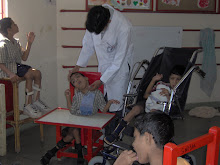Dr Anil Reddy is a Board Certified Pediatric Dentist practicing in the United States. He has specialized in special care dentistry, both from the UK and the US. An alumnus of GDC Hyderabad he visits India regularly and has been a keen observer of the dental scenario here. He spoke exclusively to DCSN on the role of Pediatric Dentists in special care dentistry, and the status of the specialization in India. In the interview he also tells us about how funds can be raised for the treatment of these children and the role of sedation in the management of these children.
DCSN: Why special needs dentistry?
Dr Anil Reddy:For me personally I felt after my training as a pediatric dentistry that here was a field where I could do something. During my residency I came across children with hearing impairment, visual impairment, and autism and I realized we were the only people with the know how and the patience to help these children. The general dentists would not treat them and parents kept bringing them back to us, so I did one more year of special needs training under the united cerebral palsy founadation. Now in an ideal world I would wish there was not a single special needs patient, but that’s not how the real world works, there are going to be individuals with certain disabilites who have certain dental needs and we need to help them. There can be no if’s and buts about that. We take a hippocratic oath to serve all patients, and if nobody helps them then there’s something seriously wrong with society we live in.
DCSN: Where do you think special needs dentistry in India is today, and where do you think it can be tomorrow?
Dr AR:When you think of special needs dentistry, you have to think of it as someting where you are going to be helping these individuals. With interested groups such as your site and some of the dental schools I see the scenario slowly changing.
DCSN: Special needs special costs. Do you agree?
Dr AR:Yes. You see I am a big believer in the merits of capitalism, alturism has it’s limits, there is only so much you can do through charity. Ultimately the money has to come from somewhere. As a practitioner, if I go to the suppliers of dental materials or chairs they will not give you the materials free simply because you tell them your motives are pure. So it is a valid cost. But if you can get funding from somewhere, then you don’t have to pass on the full burden of those costs to the parent.
DCSN: Now in the United States you have a well established healthcare payment system. Who do you see bearing those costs in a country such as India where third party payment is still in it’s infancy?
Dr AR:You would have to reach out to the relegious institutions. In the US or the UK relegious groups play a very important role in providing health care. I graduated from Columbia University, but our clinic was funded by the Presbyterian Church. Similarly you had Long Island Jewish, Baylor college in Texas is funded by the Baptist Church… all major schools are supported by these relegious groups. So in a country like India where you have such strong traditional relegious values, schools would have to reach out to them to fund Special Needs Dentistry. The government can also step in and help.
DCSN: Of all the special needs conditions, which of them is the most challenging?
Dr AR:Clinically I would have to day that Cerebral Palsy is the most challenging, simply because the child has very little under his/her own control. But if you take special needs as a whole each case is a challenge unto itself, each patient presents a unique problem to you, and there in lies the beauty of special needs dentistry. I feel you should take each patient as an opportunity from god to serve humanity. You may not be able to give the best of treatment, there have been times when I’ve done scaling for a cerebral palsy patient and I’ve had to leave the occlusal calculus as a sealant, simply because the child could not cooperate, I had to concentrate on the gingival areas. You may not do an ideal job but you’ve got to do the best you can. If in your heart you feel you have helped the patient then that is the best reward for the challenge.
DCSN: Special needs dentists have to deal with the pain of having a terminally ill patient or losing a patient . Does special needs dentistry take a toll on you emotionally? Do you need to have a heart of steel so as to not get hurt?
Dr AR:It does, to a certain level yes, you are not human if it doesn’t effect you emotionally. But it’s like in Pediatric Dentistry, the first time a kid cries, you are affected, but over a period of time you learn to manage your emotions better. I wouldn’t agree with the term steel heart, because that would be like saying we are heartless, which is false. It will wear you down but if in your heart you have the faith that you are doing the right thing, then that’s where your energy comes from.
DCSN: You are coming form the United States, where there has been a raging debate about the right to life. As a special needs dentist who is faced with this situation more often than others, where do you stand?
Dr AR:My answer is that the right to choose that lies only with the parents. I understand that conditions such as severe cerebral palsy or Down syndrome can take a toll on the parents. But if the parents are aware of the efforts involved, and are willing to put in the extra efforts then we have no right to take a life away.
DCSN: We can learn special needs dentistry, but what can we learn from special needs dentistry?
Dr AR:From these kids we learn to be human beings. They go through so much in life, be it medical procedures or surgeries, and yet when they step into your office they are smiling. That I think teaches us a lot about life.








No comments:
Post a Comment